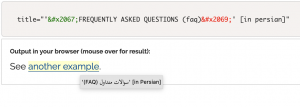Tag(s): qa-bidi-unicode-controls
Posts
Updated article: How to use Unicode controls for bidi text
The W3C Internationalization Activity has updated the article How to use Unicode controls for bidi text.
This article looks at how content authors can apply direction metadata to bidirectional text when markup is not available. It was largely rewritten to incorporate more up to date information and improve the examples.
Updated articles on bidi topics
The following articles have been updated and reviewed by the Internationalization Working Group. If you have additional comments, please send them using the “Leave a comment” link at the bottom right of the page.
How to use Unicode controls for bidi text
see the changes on github
Unicode controls vs. markup for bidi support
see changes on github
CSS vs. markup for bidi support
see changes on github
Changes include the following:
* added a quick answer
* removed background sections now that we have other articles that deal with that information (pointed to those)
* clarified the distinction between structural/block markup and inline markup wrt control character usage in a new section
* expanded the section on inline issues to take into account HTML5-related developments
* introduced concept of isolation, including RLI/LRI/FSI/PDI
* removed out of date references and quotations
* introduced the concept of tightly-wrapping all opposite-direction phrases from the HTML article
* basically rewrote everything to make it cleaner, clearer and more snappy
* replaced outdated spec links and quotes
* added reference to polyglot
* pointed to the HTML5 rendering section rather than providing a CSS template (which was out of date) in the document
New translations into German
Personennamen aus aller Welt (Personal names around the world)
Angabe der Sprache in HTML (Declaring language in HTML)
Stylen anhand von Sprachattributen (Styling using language attributes)
Kennzeichnung der Sprache von Linkzielen (Indicating the language of a link destination)
Warum man Sprachattribute verwenden sollte (Why use the language attribute?)
Unicode-Steuerzeichen vs. Markup für bidirektionalen Text (Unicode controls vs. markup for bidi support)
Verwendung von Unicode-Steuerzeichen für bidirektionalen Text (Using Unicode controls for bidi text)
HTML-Seiten in arabischer, hebräischer und anderen von rechts nach links geschriebenen Schriften erstellen (Creating HTML Pages in Arabic, Hebrew and Other Right-to-left Scripts)
Umgang mit Sprachangaben in HTML (Working with language in HTML)
These articles were translated into German thanks to Gunnar Bittersmann.
New translations into Russian and Ukrainian
Ukrainian:
Пропажа пробілів Bidi (Bidi space loss)
Використання Керуючих символів Unicode для bidi тексту (Using Unicode controls for bidi text)
Направлення скрипту і мов (Script direction and languages)
CSS чи розмітка для підтримки bidi (CSS vs. markup for bidi support)
Керуючі символи Unicode чи розмітка для підтримки bidi (Unicode controls vs. markup for bidi support)
Russian:
Пропажа пробелов Bidi (Bidi space loss)
Использование Управляющих символов Unicode для bidi текста (Using Unicode controls for bidi text)
Направления скрипта и языков (Script direction and languages)
CSS или разметка для поддержки bidi (CSS vs. markup for bidi support)
Управляющие символы Unicode или разметка для поддержки bidi (Unicode controls vs. markup for bidi support)
These articles were translated thanks to Alexandr Shlapak.
New translations into Spanish
Uso de los elementos b e i (Using b and i elements)
Uso de controles Unicode para texto bidi (Changing (X)HTML page encoding to UTF-8)
These articles were translated into Spanish thanks to the Spanish Translation Team, Trusted Translations, Inc.
New article: Using Unicode controls for bidi text
FAQ-based article: If I’m unable to use markup to correctly order bidirectional text, what can I do?
By Richard Ishida, W3C.
Article for wide review: Using Unicode controls for bidi text
Comments are being sought on this article prior to final release. Please send any comments to www-international@w3.org (subscribe). We expect to publish a final version in one to two weeks.
W3C® liability, trademark and permissive license rules apply.
Questions or comments? ishida@w3.org
